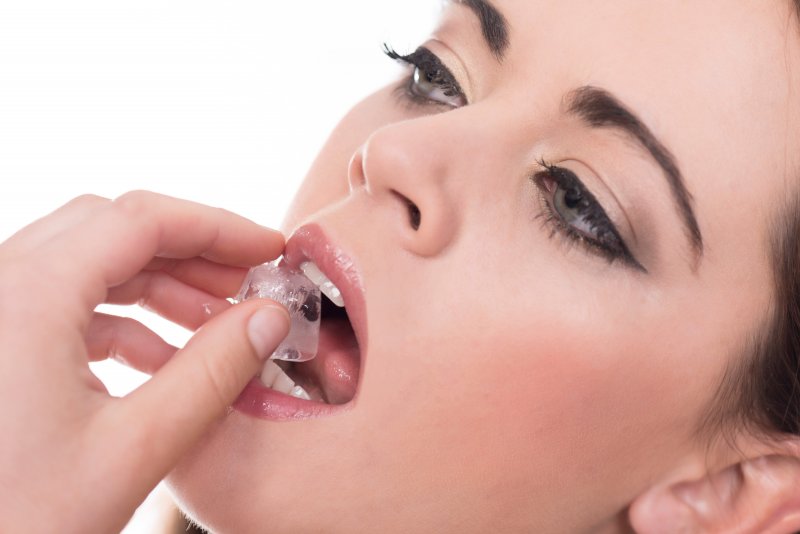
It’s summertime! After finishing a drink, some people mindlessly munch on leftover ice cubes as a cold treat during hot weather. Even though it’s satisfying, the seemingly harmless habit can damage your teeth, enamel, and gums. Are you guilty of chewing on ice? Read on to find out how it can harm your smile and a few alternatives so you can safely get your fix.
Why Do People Chew on Ice?
Some people might chew on ice out of boredom, relief from dry mouth, stress, or an attempt to cut back on food consumption. However, others might do so because they suffer from pica, a medical term for craving and chewing on things with little or no nutritional value (ice, dirt, clay, chalk, paint, sand, rocks). The most common form of this disorder is pagophagia, which is the compulsive consumption of ice or iced drinks. Studies indicate that it’s a symptom of iron deficiency anemia and suspect that anemics are compelled to chew on ice cubes because they soothe oral inflammations caused by iron deficiencies.
What Are the Dangers of Chewing on Ice?
Chewing on ice cubes might not seem as harmful as other addictions, but it can still cause dental damage. It can lead to chipped or cracked teeth, damage to the enamel, sore jaw muscles, and problems with existing dental work like fillings and crowns. Plus, it can make your teeth more susceptible to cavities and sensitive to food and drinks at extreme temperatures.
How to Break an Ice-Chewing Habit
What if the habit is so entrenched that you can’t give it up? Here are a few tips and tricks that can help:
- Get a physical checkup. If you feel addicted to chewing on ice, get a checkup to determine the underlying cause. You might have anemia, meaning proper treatment can help you drop the habit.
- Switch to cold drinks or popsicles. Do you chew on ice because of dry moutha or you’re trying to quit smoking? Consider switching to cold drinks or popsicles instead!
- Let the ice cubes melt. Instead of eating ice cubes, let them slowly melt in your mouth. You’ll get a satisfying cool treat that lasts longer and won’t put your smile at risk.
- Find crunchy alternatives. Do you crave the feeling of crunching through ice cubes? Find a healthier alternative to satisfy your craving. Carrots, cucumbers, apples, and celery are just a few excellent options that benefit your health.
- Choose a slushie instead. Try replacing the ice cubes with softer, semi-melted, finely shaven pieces of ice. It’s less likely to cause damage to your teeth, enamel, and gums!
As you can see, chewing on ice can leave a lasting mark on your oral health. By following the tips outlined above, you can keep your smile strong and healthy this summer!
About the Author
Dr. Robert Sikes provides exceptional, personalized, and quality dental care to create happy and healthy smiles. He earned his Doctor of Dental Surgery from the Baylor College of Dentistry in 1981 and now has over 30 years of experience. Dr. Sikes enjoys educating his patients to help them make informed decisions about their oral health. If you have any questions about how chewing on ice can harm your smile, he’s more than happy to answer them for you. Visit our website or call (903) 572-9720 to schedule an appointment with Dr. Sikes.
